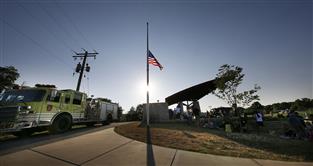Health premiums could go up
Link between union, nonunion staff for health insurance to end
The quarter of the city's work force that isn't represented by a union may pay 10 percent toward health insurance premiums in 2011.
Several of the 85 affected employees on Tuesday said they expect to eventually contribute more of their own money toward health benefits but any decisions should wait until after the city reaches bargaining agreements with the unions.
Historically, nonrepresented compensation changes have matched whatever decisions come out of union negotiations. If the Common Council approves the increased cost-sharing it would put an end to that practice, said Beth Aldana, city human resources director.
"There's never been any obligation for that," she said. "It's been tradition."
The existing level of compensation for all employees is not sustainable long term and not reflective of what most taxpayers deal with in private-sector employment, so now looks like the right time to make financial and policy changes, administrators said.
Deciding the premium change now would give employees who are contemplating retirement a few months to come to a decision. Those who leave prior to Feb. 1, would not be affected by the premium change in their retirement, Aldana said.
She provided information on the impact of 5, 10 and 15 percent payment of premiums, but the recommendation was to shoot for 10 percent in the preliminary budget for next year.
At this time, most employees pay 2.5 percent of their premium costs, but would get a break from the expected 5 percent as an incentive for participating in the city's wellness program.
"A 2 1/2 percent contribution is just laughable," Alderman Brian Ewerdt said as the Employee Relations Committee deliberated on the changes. "It's been a nice perk. But we're in an entirely different time now."
The city is collecting $38,678 from all nonrepresented employees for premiums this year. A 10 percent payment would bring that to $154,142 in 2011.
Many of the nonrepresented employees have reached the top rung of the pay ladder for their positions and the city has budgeted no money for cost-of-living increases next year. For those employees, the additional premium contribution will mean a reduction in overall take-home pay next year, Police Capt. Dale Weiss said.
"That's a pretty big hit," he said.
Depending on what the unions negotiate, subordinates could make more than their supervisors. In fact, a few already do, Weiss said.
"You don't want your department heads making less than the people they supervise," he said.
That would serve as a major deterrent to leaving the stability of union representation to take a supervisory role, said Lt. Chris Fox, who heads up an organization of Wauwatosa police supervisors.
"There will be those that will not take that step forward," he said.
Deputy Fire Chief Bill Rice said that with three of the seven chief officers expected to retire from the Fire Department in the next couple of years, he's worried it will deter top talent from climbing the ranks.
By waiting until the union finishes negotiations and adopting the same package for nonrepresented employees, it evens the playing field and takes away much of the disincentive for moving up, said Assistant Fire Chief Michael Anton, who serves as spokesman for the Employee Council, a group that deals with issues facing the nonrepresented employees.
Anton said the frustration level is higher than normal for nonrepresented employees, and the recently announced retirements of the finance director, fire chief and public works director will increase the remaining managers' workloads.
By putting the premium contribution of 10 percent through now, nonrepresented employees are just looking to get hit twice, Weiss said. He fully expects that if the unions make concessions on other aspects of health insurance like co-pays and deductibles, those will get passed on to their nonrepresented counterparts.
The Employee Relations Committee unanimously recommended the 10 percent figure. The Common Council is likely to take up the issue at its Nov. 2 meeting.
| 2010 rate/premium equivalent | 2010 employee cost sharing | 5% cost sharing option | 10% cost sharing option | 15% cost sharing option | |
|
Family health insurance plan monthly premium costs |
$1,511 | $38 | $76 | $151 | $227 |
|
Family health insurance plan annual premium costs |
$18,134 | $455 | $907 | $1,813 | $2720.04 |
The family plan was used because the greatest number of city employees, and the largest number of nonrepresented workers, use this plan.
The rates are from 2010. The 2011 rates have not been adopted, but are expected to be at least 6 percent higher.
Contribution comparison
The following is information on how Wauwatosa compares with neighboring communities when it comes to cost shares on health insurance premiums.
| CITY | CONTRIBUTION |
| Brookfield | 10 percent with wellness program participation, 15 percent without wellness |
| Greenfield | 9 percent not to exceed cap of $80 per single and $130 per family plan. |
| New Berlin | 3 percent |
| Oak Creek | 10 percent with wellness program participation, 15 percent without wellness |
| Waukesha | 6 percent with wellness with a maximum $35 for single and $100 for family if wellness participant, 8 percent with $50 single and $100 family plan max if no wellness |
| West Allis | 5 percent not to exceed $60 single, $120 family per month |
More from News and Features
- Anodyne Coffee plans to open location in Wauwatosa Village
- Wauwatosa Meetings: Aug. 4
- Video: Wauwatosa girl's curbside ice cream stand raises money for the hungry
- Wauwatosa News and Notes: Hands-only CPR training offered; Firefly Art Fair is Aug. 6-7
- Wauwatosa Ask Now: Why are there barriers and fencing along the North Avenue bridges over the Menomonee River?
- Mystery Photo Contest: July 28
- Wauwatosa gears up for National Night Out event, this year at the zoo
- Election 2016: Wisconsin's 4th District candidates weigh in
- Wauwatosa's Luther Manor residents share smiles through flower delivery
- Wauwatosa Police Report: July 17-23














